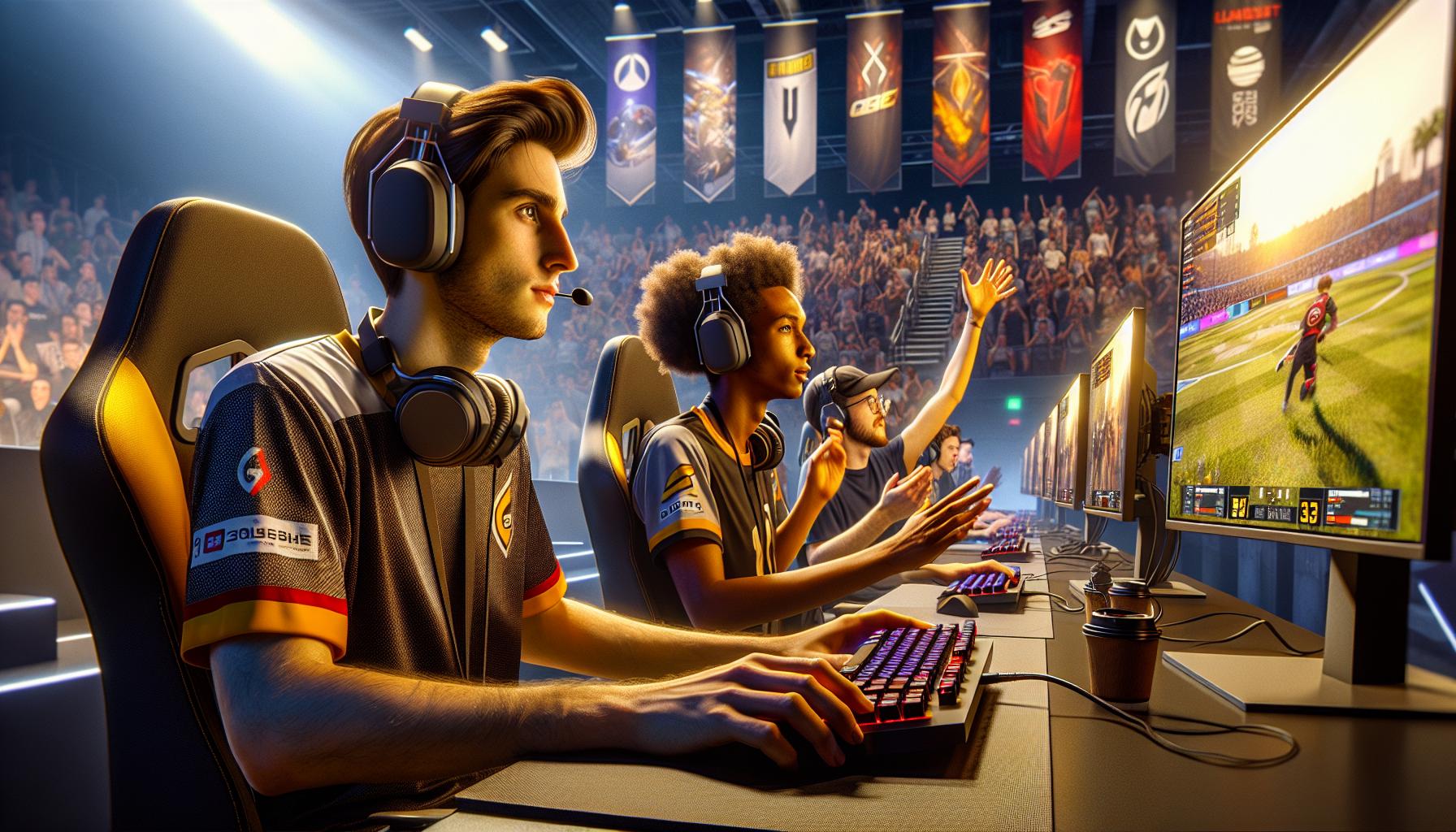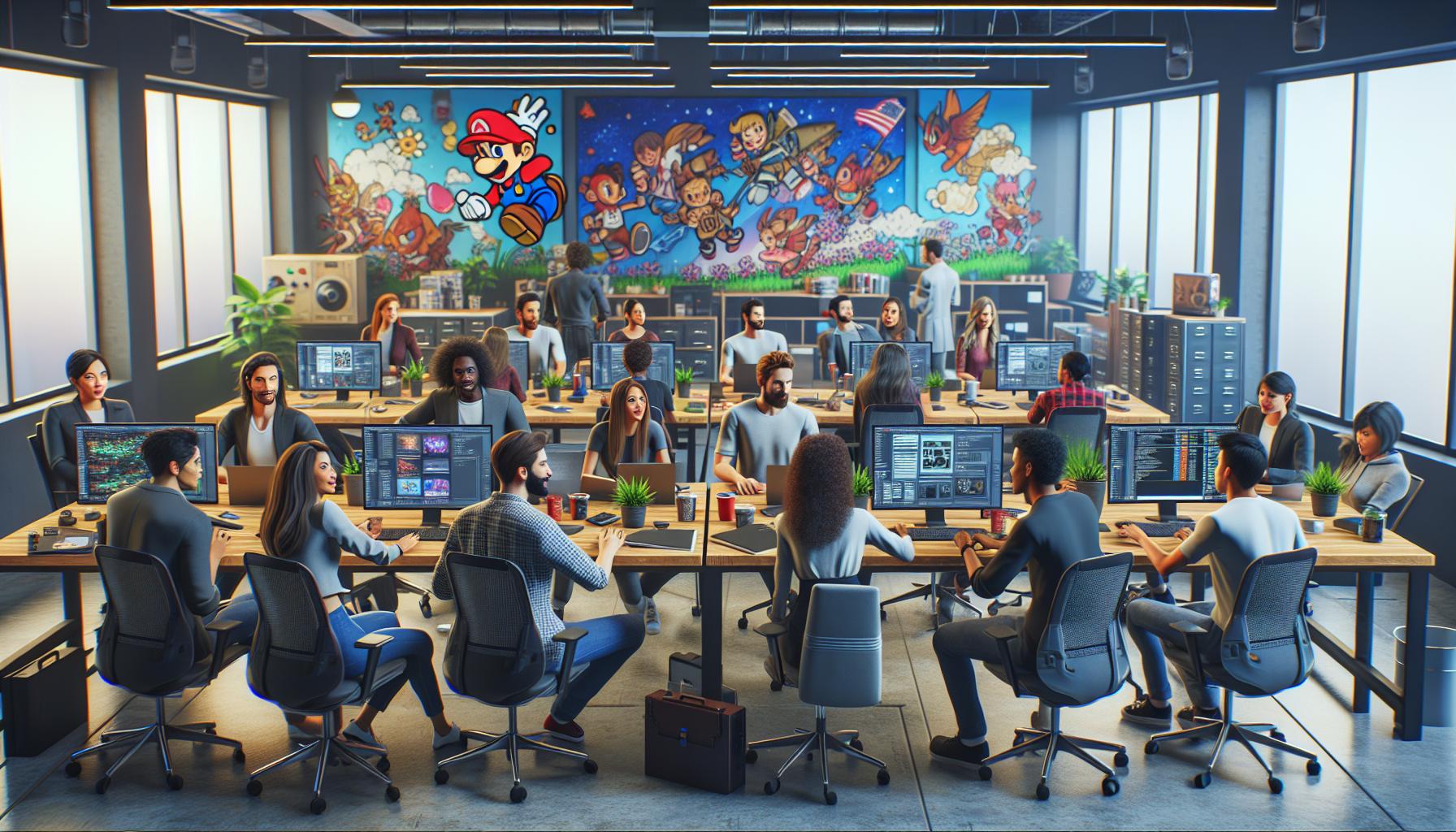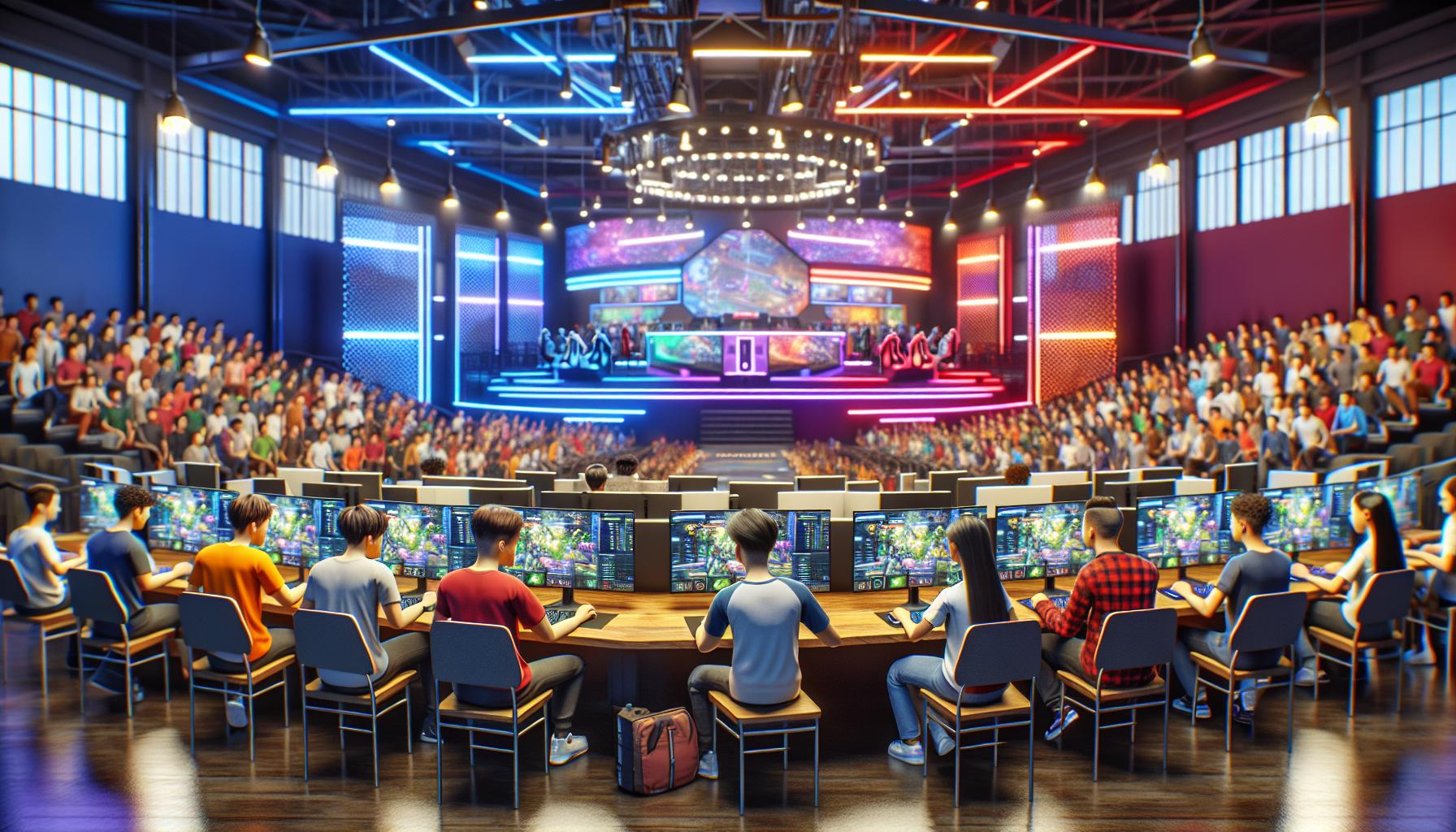Esports Major: Your Complete Guide to College Degrees in Professional Gaming

As a passionate gamer who’s witnessed the explosive growth of competitive gaming, I’ve seen esports transform from a niche hobby into a billion-dollar industry. Today’s universities are recognizing this shift by offering dedicated esports majors, preparing students for diverse careers in this dynamic field.
I’ve researched extensively how these programs combine business management, game design, event planning, and digital marketing to create well-rounded professionals. Whether you’re dreaming of becoming a professional player, team manager, or tournament organizer, an esports major can provide the foundation you’ll need. The best part? This industry’s currently experiencing unprecedented growth, with job opportunities expanding faster than ever before.
Key Takeaways
- Esports majors combine business management, game design, and competitive gaming education to prepare students for careers in the rapidly growing gaming industry
- Core curriculum includes business fundamentals (marketing, finance), technical skills (broadcasting, streaming), gaming-specific courses, and hands-on practical experience
- Career opportunities are diverse, ranging from game development and tournament direction to content production and team management, with competitive salaries and strong growth rates
- Leading universities offer accredited bachelor’s and associate degree programs with professional-grade facilities, industry partnerships, and extensive internship opportunities
- Students gain practical experience through 12-15 sanctioned collegiate tournaments per semester, learning tournament operations, broadcasting, and team management
- Industry partnerships with major gaming companies like Riot Games and Blizzard provide direct pathways to employment, with 70% of interns receiving job offers in their chosen specialization
What Is an Esports Major in College
An esports major combines competitive gaming education with business management coursework to prepare students for careers in the gaming industry. The curriculum integrates core subjects such as:
- Marketing strategies for gaming brands
- Tournament organization principles
- Team management fundamentals
- Live streaming production techniques
- Game design analysis methods
The program structure typically includes four main components:
- Core Business Classes
- Financial management
- Marketing fundamentals
- Project management
- Business communications
- Gaming-Specific Courses
- Esports ecosystem analysis
- Gaming industry trends
- Competition strategies
- Professional gaming ethics
- Technical Training
- Broadcasting software
- Stream management tools
- Video production equipment
- Analytics platforms
- Practical Experience
- Tournament planning
- Team coaching
- Event management
- Content creation
| Program Component | Credit Hours | Focus Areas |
|---|---|---|
| Business Core | 30-36 | Management & Marketing |
| Gaming Studies | 24-30 | Industry & Competition |
| Technical Skills | 18-24 | Production & Analytics |
| Practical Training | 12-15 | Hands-on Experience |
Students gain access to professional-grade facilities including:
- Broadcasting studios
- Gaming practice rooms
- Competition venues
- Production laboratories
The coursework emphasizes hands-on experience through internships partnerships with:
- Professional esports teams
- Game publishers
- Tournament organizers
- Gaming media outlets
- Esports team managers
- Tournament directors
- Gaming brand marketers
- Content production specialists
- Event coordinators
Career Opportunities for Esports Graduates

Esports graduates enter a dynamic job market with diverse career paths across the gaming industry. The field offers specialized roles that combine technical expertise with business acumen.
Game Development and Design
Game development careers focus on creating engaging competitive gaming experiences. Professional opportunities include:
- Engine Programmers: Developing core systems for game mechanics
- Level Designers: Crafting balanced competitive maps
- UI/UX Designers: Creating intuitive player interfaces
- Competitive Balance Analysts: Fine-tuning gameplay mechanics
- QA Testers: Identifying bugs affecting competitive integrity
- Event Directors: Coordinating large-scale tournaments
- Competition Administrators: Enforcing rules during matches
- Logistics Coordinators: Managing venue operations
- Broadcast Producers: Overseeing tournament streams
- Player Relations Managers: Supporting professional athletes
| Position | Average Annual Salary (USD) | Growth Rate |
|---|---|---|
| Game Developer | $85,000 | 22% |
| Tournament Director | $65,000 | 18% |
| Event Coordinator | $48,000 | 15% |
| Broadcast Producer | $72,000 | 20% |
Top Universities Offering Esports Programs

Leading universities across the United States offer comprehensive esports education programs through dedicated departments and state-of-the-art facilities. These institutions provide specialized curricula that combine competitive gaming with business fundamentals.
Bachelor’s Degree Options
The following universities offer accredited bachelor’s degree programs in esports:
| University | Program Name | Key Features |
|---|---|---|
| Ohio State University | BS in Esports and Game Studies | Gaming arena, broadcasting studio |
| Full Sail University | BS in Sports Marketing & Media: Esports | Industry partnerships, production facilities |
| Harrisburg University | BS in Esports Management | Varsity team, 174,000-sq-ft facility |
| University of California Irvine | BA in Business Administration: Esports Management | First public university esports program |
| Becker College | BS in Esports Management | Live event production lab |
Each program features:
- Professional-grade gaming equipment
- Broadcasting facilities
- Competition spaces
- Industry internship opportunities
- Career development resources
Associate Degree Programs
Two-year associate degrees provide focused training in esports fundamentals:
| College | Program | Duration | Focus Areas |
|---|---|---|---|
| Butler Community College | Associate in Esports Management | 2 years | Event planning, marketing |
| St. Clair College | Associate in Esports Administration | 2 years | Team management, broadcasting |
| Hawkeye Community College | Associate in Digital Media: Esports | 2 years | Content creation, streaming |
- Tournament organization training
- Streaming technology education
- Basic game design principles
- Marketing fundamentals
- Event coordination experience
Core Curriculum and Coursework

The core curriculum in esports majors combines business fundamentals with specialized gaming industry knowledge. The coursework integrates practical skills development with theoretical understanding across multiple disciplines.
Business and Marketing Classes
Business and marketing classes form the foundation of esports education programs. Core courses include:
- Financial Management focusing on esports organization budgeting
- Digital Marketing strategies for gaming platforms
- Brand Development specific to gaming communities
- Sports Business Analytics covering viewership metrics
- Project Management for tournament operations
- Sponsorship Strategy targeting gaming demographics
The curriculum emphasizes real-world applications through case studies from successful esports organizations like Team Liquid, FaZe Clan, and Cloud9.
Technical Skills Development
Technical training focuses on industry-standard tools and software applications. Key technical components include:
- Broadcasting software operation (OBS, XSplit)
- Video editing platforms (Adobe Premiere Pro, DaVinci Resolve)
- Streaming platform management (Twitch, YouTube Gaming)
- Tournament organization software (Battlefy, FACEIT)
- Analytics tools (Stream Hatchet, Newzoo)
- Game engine fundamentals (Unity, Unreal Engine)
Students gain hands-on experience through:
- Live production sessions in dedicated broadcast studios
- Virtual tournament hosting using professional platforms
- Content creation projects using industry-standard equipment
- Team-based projects simulating real esports operations
- Technical workshops led by industry professionals
The technical curriculum adapts to emerging technologies and industry standards, ensuring students master current tools while preparing for future innovations.
Industry Partnerships and Internships
Leading esports programs partner with prominent gaming companies like Riot Games, Blizzard Entertainment & Epic Games to provide students with direct industry exposure. These partnerships create exclusive internship opportunities in specialized areas:
- Tournament Operations: Working with ESL Gaming to manage competitive events
- Content Production: Creating digital content for Team SoloMid & Cloud9
- Brand Marketing: Developing campaigns with companies like HyperX & Razer
- Game Development: Contributing to projects at Ubisoft & Electronic Arts
- Event Broadcasting: Supporting productions with Twitch & YouTube Gaming
Top esports programs integrate practical experience through structured internship programs:
- 300+ hours of supervised work experience
- Direct mentorship from industry professionals
- Portfolio development opportunities
- Networking events with partner companies
- Performance evaluations from industry leaders
Key partnership benefits include:
- Access to professional-grade equipment & facilities
- Industry certification programs
- Guest lectures from esports executives
- Beta testing opportunities for new games
- Priority consideration for full-time positions
| Partner Type | Average Annual Internships | Conversion Rate to Full-Time |
|---|---|---|
| Game Publishers | 45 | 65% |
| Esports Teams | 75 | 72% |
| Tournament Organizers | 60 | 68% |
| Gaming Hardware Companies | 40 | 58% |
| Broadcasting Platforms | 35 | 61% |
These partnerships create a direct pipeline from education to employment, with 70% of internship participants receiving job offers within their chosen specialization. The hands-on experience combines classroom learning with real-world applications in professional settings.
Competition and Tournament Experience
Professional-grade esports tournaments play a central role in the competitive gaming curriculum. Students participate in 12-15 sanctioned collegiate tournaments per semester through organizations like the National Association of Collegiate Esports (NACE) and Collegiate StarLeague (CSL).
The tournament experience includes:
- Operating broadcast equipment during live matches
- Managing team rosters for 5-8 competitive titles
- Coordinating with tournament administrators across multiple platforms
- Analyzing match data using professional analytics software
- Creating promotional content for tournament streams
Students gain hands-on practice through:
- Weekly scrimmage sessions with other collegiate teams
- In-house tournaments with 64+ participants
- Remote competition management using platforms like Battlefy
- Live commentary and shoutcasting for broadcast matches
- Post-game analysis and performance reviews
Tournament management skills covered:
- Bracket creation and seeding methodologies
- Prize pool distribution calculations
- Player registration system administration
- Match scheduling across time zones
- Conflict resolution procedures
| Tournament Type | Hours Required | Matches Per Semester |
|---|---|---|
| Collegiate Series | 120 | 24-30 |
| In-house Events | 80 | 16-20 |
| Exhibition Matches | 40 | 8-10 |
| Major Championships | 160 | 12-15 |
Students participate in collegiate esports conferences for titles like:
- League of Legends
- Valorant
- Rocket League
- Super Smash Bros
- Overwatch
The program incorporates professional competition standards through partnerships with organizations like ESL Gaming and DreamHack, exposing students to industry-standard tournament operations practices.
Conclusion
I believe pursuing an esports major opens doors to countless opportunities in this thriving industry. The combination of business acumen technical expertise and hands-on experience creates well-rounded professionals ready to tackle the challenges of tomorrow’s gaming landscape.
The comprehensive curriculum industry partnerships and competitive tournament experience equip students with everything they need to succeed. Whether you’re dreaming of managing professional teams developing games or organizing major tournaments there’s a place for you in this dynamic field.
As the esports industry continues its explosive growth I’m confident that graduates of these programs will play pivotal roles in shaping its future. It’s an exciting time to enter this field and the possibilities are truly limitless.



